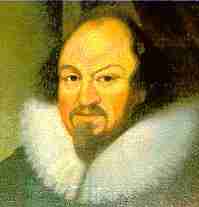Much Ado About ... YouTube

Dedicated to the proposition that Christopher Marlowe was not killed in 1593, but lived long enough to write poems and plays attributed to the actor William Shakespeare.
Did Christopher Marlowe write Shakespeare's Plays? -
On the morning of May 30, 1593, Christopher Marlowe met with three associates in the English intelligence network. Days earlier, a list of charges against him that included heresy, blasphemy and treason had been delivered to the Privy Council. Later that evening the Queen's Coroner was summoned to their meeting place. A body lay on the floor. After an inquest, the dead man was taken to a nearby churchyard busy at the time receiving victims of the plague. According to the official report, England's foremost playwright was interred without fanfare or marker.
Soon, plays attributed to William Shakespeare began to appear on the London stage, plays so undeniably similar to Marlowe's that noted scholars have since declared that Shakespeare wrote as if he had been Marlowe's apprentice.
Marlowe's Ghost explores the possibility that persecution of a writer who dared to question authority may have led to the greatest literary cover-up of all time.
An extraordinary book by Roberta Ballantine reveals the last half of Marlowe’s life: twenty-nine years filled with high adventure, touching dramatic writings, his mentors, employers and friends, lovers, wives and children and the most difficult kind of loyal service to England. Missing from every previous biography of Marlowe, many events in his life now appear for the first time, fused from increments of factual evidence beautifully corroborated by surprising steganographic messages created by the man himself – a peerless writer and ghost of all the Shakespeare works.
Darby Mitchell's essay, ''And thereby hangs a tail/tale': the Memoirs of an Arse Poetica' is available on disk at castlepublishing.net or from the author.
Coalition aims to expose Shakespeare:
"Acclaimed actor Derek Jacobi and Mark Rylance, the former artistic director of Shakespeare's Globe Theater in London, unveiled a 'Declaration of Reasonable Doubt' on the authorship of Shakespeare's work Saturday, following the final matinee of 'I am Shakespeare,' a play investigating the bard's identity, in Chichester, southern England. . . ." -- - Yahoo! NewsThe declaration put forward by the Shakespeare Authorship Coalition — signed online by nearly 300 people — aims to provoke new research into who was responsible for the plays, sonnets and poems attributed to the writer.
Jacobi and Rylance presented a copy of the document to William Leahy, head of English at Brunel University in west London and head of the first graduate program in Shakespeare Authorship Studies, which begins this month."
A shoutout to Terry Ross and Dave Kathman and the gang at HLAS, which celebrate its 10th anniversary today (appropriately on 'Shakespeare's' birthday).
Reported in The Times Online (London): "Park Honan, a scholar and biographer, has unearthed a “crucial” document that reveals that the murderer, Ingram Frizer — a known conman who received a royal pardon just a month after stabbing the poet — was later rewarded with extensive property."
This year's winning essay is "The Marlowe-Shakespeare authorship debate: approaching an old problem with new methods," by Ary Goldberger MD, Albert Yang MD and CK Peng Phd.
Google Search: Weir Bacon poet group:humanities.lit.authors.*: "Was Bacon capable of writing with 'drama and intensity?'"
Today I put my foot back in the water (if not in my mouth) at HLAS, with a post to Elizabeth Weir, the industrious Baconian, who must have thousands of posts to HLAS by now. In the past, I've chided her for ducking my questions re: Francis Bacon and ignoring evidence for Marlowe. In my latest post, I ask her to offer any facts she has that Bacon was a poet. If she's already posted it, she may be put off by my laziness, so I should look for evidence myself.
M.B. Malyutov has written Fusion of Various Methods for Resolving the Shakespeare Controversy. Documentary and literary evidence on the authorship attribution of works traditionally ascribed to Shakespeare is complemented by several micro-style, macro-style tests and a study of the validity of anagrams deciphered in the Shakespearean canon.
I pointed out in the Marlovian newsletter months ago that Ben Jonson's Invitation to a Grave Friend (quoted in Garrison Keillor's Writer's Almanac - DECEMBER 22 - 28, 2003) refers to thought-to-be-dead Marlowe.
Roberta Ballantine's Christopher Marlowe website
According to new research from a University of Warwick historian, "the foul language and public name-calling hurled around on the streets of Elizabethan England from 1500 to 1700 was far worse than anything we hear today."
In the Sarasota Herald Tribune: Roberta Ballantine claims ciphers decode literary puzzle
It appears that the RM sonnet was a pastiche of Jim's, no?
Posted replies to Grumman, Brennen and Lorenzo. Suitable to each, I hope.
> >We'll never know, I guess-- their tongues are tied,
Text of The Rape of Lucrece
 Met John Hippisley in Denver last weekend. He was the guy dressed up as "Marlowe" to promote Marlowe's Restaurant in Canterbury, England ten years ago, during events to commemorate the 400th anniversary of Marlowe's "sudden end" in 1593. We travelled to Colorado Springs for a meeting of the Marlowe Lives! Association at Garden of the Gods. I'll post some photos later.
Met John Hippisley in Denver last weekend. He was the guy dressed up as "Marlowe" to promote Marlowe's Restaurant in Canterbury, England ten years ago, during events to commemorate the 400th anniversary of Marlowe's "sudden end" in 1593. We travelled to Colorado Springs for a meeting of the Marlowe Lives! Association at Garden of the Gods. I'll post some photos later.
 If you read the post below about Neil Brennen, just today I heard from Dr. Peter Groves, a lecturer at Monash University in Australia, who wrote a book on English meter, who claimed that Brennen's verses scanned fine as iambic pentameter (I think that's what he meant. I wrote to him for clarification. )
If you read the post below about Neil Brennen, just today I heard from Dr. Peter Groves, a lecturer at Monash University in Australia, who wrote a book on English meter, who claimed that Brennen's verses scanned fine as iambic pentameter (I think that's what he meant. I wrote to him for clarification. )
 There's this guy who looks like this, who posts to the HLAS newsgroup, "Spam Scone" (Neil Brennen) who is always making demeaning remarks about people, but doesn't offer any evidence or information himself (that I have noticed). He's been on Greg Reynolds case for a long time, and Greg has been putting up Quality posts there for years! This morning I wrote Neil the following e-mail message:
There's this guy who looks like this, who posts to the HLAS newsgroup, "Spam Scone" (Neil Brennen) who is always making demeaning remarks about people, but doesn't offer any evidence or information himself (that I have noticed). He's been on Greg Reynolds case for a long time, and Greg has been putting up Quality posts there for years! This morning I wrote Neil the following e-mail message:
 Okay, that was that... You've read this far, stay with me ...The night before I posted some verses in the "Rime Royal" newsgroup thread (HLAS) to Lorenzo, a poet from California with whom I've had friendly e-mail exchanges:
Okay, that was that... You've read this far, stay with me ...The night before I posted some verses in the "Rime Royal" newsgroup thread (HLAS) to Lorenzo, a poet from California with whom I've had friendly e-mail exchanges:
a reminder Elizabeth Weir that she has some splainin' to do in the Kathman's Critics thread. Also, who else might have been given access to the Strachey report--names if you have them. (if you've already answered this, where?)
 I agree with Mark Steese, Richie Miller isn't fanatic, but Weir isn't hateful either. I appreciate Richie's closer look at the Hunt(?) annotation on his website. ... Keep up the good work, Miller. Your decision to put the Oxfrodian (sic) lunacy behind you speaks well of your common sense. Looking forward to your attempt to demolish the Marlowe case for authorship. Here's a start: there is no Marlowe case. He was killed on May 30, 1593 (nearly every regular poster to this group will agree.) And yet, a niggling possibility remains. I mean, pigs COULD fly couldn't they? You could strap them into a hang glider, they'd probably really enjoy it, the breeze blowing in their snouts, ears blowing back. If only someone would put up some evidence that his death was faked. Here, what's this?
I agree with Mark Steese, Richie Miller isn't fanatic, but Weir isn't hateful either. I appreciate Richie's closer look at the Hunt(?) annotation on his website. ... Keep up the good work, Miller. Your decision to put the Oxfrodian (sic) lunacy behind you speaks well of your common sense. Looking forward to your attempt to demolish the Marlowe case for authorship. Here's a start: there is no Marlowe case. He was killed on May 30, 1593 (nearly every regular poster to this group will agree.) And yet, a niggling possibility remains. I mean, pigs COULD fly couldn't they? You could strap them into a hang glider, they'd probably really enjoy it, the breeze blowing in their snouts, ears blowing back. If only someone would put up some evidence that his death was faked. Here, what's this?
To Dave K:

Yo, Richard, what's the point? I agree with Kathman: it can be a waste of time "debating" true-believers in the HLAS newsgroup. And Dave, to his credit, provides the group with (often) much-needed factual correctives.
Lorenzo, i took your challenge
Latest News from the Marlowe Society Marlowe Day Sept. 27
You and Dave have got me going now. I'll have to dive deeper into your site and
Well, I'm here to learn and teach and have fun.
 Darby Mitchell's corker of a theory was introduced to the gang at HLAS today . . . here. The big problem I have with it is that Boyle's prose is so crude. I wonder if anyone else will point this out...I suppose a writer as great as Shakespeare (i.e. Marlowe) could fabricate the diary of crude man of affairs, though, but why?
Darby Mitchell's corker of a theory was introduced to the gang at HLAS today . . . here. The big problem I have with it is that Boyle's prose is so crude. I wonder if anyone else will point this out...I suppose a writer as great as Shakespeare (i.e. Marlowe) could fabricate the diary of crude man of affairs, though, but why?
 I told my buddy Bob Grumman that I would write a blog about him because he responded to one of my queries with a query of his own. . . Bob and I have bit of a history together. . .It got to the point where I had to ask him--rather rudely--to stay out of my threads, because he would always muck them up (it seemed). But to give the devil his due, Bob is an inventive thinker and indefatigable poster, and he's learned a few things since those days. I even videotaped an interview with him for a documentary I was making a couple years ago. In it, he discusses his interest in Shakespeare authorship, and admits to being the bete noir of his mental construct, a "rigidnik"! I should make a little .mpeg of it and post it--if he keeps calling other people in the HLAS newsgroup "insane." ;-)
I told my buddy Bob Grumman that I would write a blog about him because he responded to one of my queries with a query of his own. . . Bob and I have bit of a history together. . .It got to the point where I had to ask him--rather rudely--to stay out of my threads, because he would always muck them up (it seemed). But to give the devil his due, Bob is an inventive thinker and indefatigable poster, and he's learned a few things since those days. I even videotaped an interview with him for a documentary I was making a couple years ago. In it, he discusses his interest in Shakespeare authorship, and admits to being the bete noir of his mental construct, a "rigidnik"! I should make a little .mpeg of it and post it--if he keeps calling other people in the HLAS newsgroup "insane." ;-)
 Somebody named "Daryll Walker" from England (possibly a pseudonym for Paul Crowley) writes to HLAS about a book he read recently Cryptogrammaton the eBook by SeanAlonzo, in which, says Walker, the author gives a strong argument that [the First Folio] was written by a collective edited by Francis Bacon, and contributed to by various members, most notably Edward De Vere, Edmund Spenser, Sir Walter Raleigh, Sir Phillip Sydney, John Lyly, Robert Greene, Thomas Kyd, George Peele, Francis Beaumont, William John Donne, John Fletcher, Ben Jonson, Christopher Marlowe and Francis Bacon, because (says Walker):
Somebody named "Daryll Walker" from England (possibly a pseudonym for Paul Crowley) writes to HLAS about a book he read recently Cryptogrammaton the eBook by SeanAlonzo, in which, says Walker, the author gives a strong argument that [the First Folio] was written by a collective edited by Francis Bacon, and contributed to by various members, most notably Edward De Vere, Edmund Spenser, Sir Walter Raleigh, Sir Phillip Sydney, John Lyly, Robert Greene, Thomas Kyd, George Peele, Francis Beaumont, William John Donne, John Fletcher, Ben Jonson, Christopher Marlowe and Francis Bacon, because (says Walker):
 After a series of stunning victories, HLAS Marlowe-guru Peter Farey (click on his photo at left) has temporarily retreated, undoubtedly doing further research to shore up the already formidable case he makes on his website.
After a series of stunning victories, HLAS Marlowe-guru Peter Farey (click on his photo at left) has temporarily retreated, undoubtedly doing further research to shore up the already formidable case he makes on his website.
 Meanwhile, Terry Ross (click on his picture) is ignoring the obvious need to clarify the reference to the name Shakespeare in 1593 on his website (along lines suggested by Farey), since it implies that the name was included in the registration and people have been confused by it (see below).
Meanwhile, Terry Ross (click on his picture) is ignoring the obvious need to clarify the reference to the name Shakespeare in 1593 on his website (along lines suggested by Farey), since it implies that the name was included in the registration and people have been confused by it (see below).